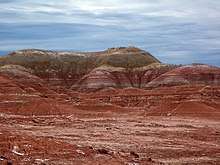Malargüe Group
The Malargüe Group is a group of geologic formations of the Neuquén Basin of the Mendoza, Neuquén, Río Negro and La Pampa Provinces in northern Patagonia, Argentina. The formations of the Malargüe Group range in age between the middle Campanian to Deseadan, an Oligocene age of the SALMA classification, straddling the Cretaceous–Paleogene boundary, about 79 million to 30 million years in age. The group overlies the older Neuquén Group, separated by an unconformity dated to 79 Ma.[1] The rocks of the Malargüe Group comprise both marine and continental deposits which are over 400 m (1312 ft) thick in total.[2]
| Malargüe Group Stratigraphic range: Early Maastrichtian-Deseadan ~79–30 Ma | |
|---|---|
 Outcrop of the Allen Formation at Auca Mahuida | |
| Type | Group |
| Sub-units | |
| Overlies | Neuquén Group Río Colorado Subgroup Anacleto Formation |
| Lithology | |
| Primary | Mudstone, sandstone, conglomerate |
| Other | Limestone, tuff, paleosol |
| Location | |
| Coordinates | 40.0°S 66.6°W |
| Approximate paleocoordinates | 42.8°S 52.2°W |
| Region | La Pampa, Río Negro, Neuquén & Mendoza Provinces |
| Country | |
| Extent | Neuquén Basin |
| Type section | |
| Named for | Malargüe |
 Malargüe Group (Argentina) | |
Subdivision
The Malargüe Group is subdivided into:
- Agua de la Piedra Formation (Deseadan) - white-grayish tuffs and tobaceous paleosols[3]
- Roca Formation (Maastrichtian to Danian) - coastal mudstones and sandstones[4]
- Jagüel Formation (middle Maastrichtian to Danian) - shallow marine mudstones[5]
- Loncoche Formation (late Campanian to early Maastrichtian) - terrestrial conglomerates and sandstones, delta plain sandstones and limestones[6]
- Allen Formation (middle Campanian to early Maastrichtian) - eolian sandstones and fluvio-lacustrine mudstones and limestones
Fossil content
Fossils of dinosaurs, plesiosaurs, turtles (Euclastes,[7] Mendozachelys wichmanni),[8] Paleoanculosa sp.,[9] fish,[10] birds (cf. Andrewsornis sp.)[11] and mammals have been recovered from the strata that make up the Malargüe Group.[12]
- Mammals of the Agua de la Piedra Formation
Archaeohyrax suniensis, Argyrohyrax proavus, Asmodeus petrasnerus, Fieratherium sorex, Gualta cuyana, Hegetotheriopsis sulcatus, Mendozahippus fierensis, Meteutatus aff. lagenaformis, Proborhyaena gigantea, Prohegetotherium malalhuense, P. schiaffinoi, P. cf. sculptum, Propachyrucos cf. smithwoodwardi, ?Prozaedyus aff. impressus, Pyrotherium romeroi, Stenotatus aff. ornatus, Trachytherus cf. spegazzinianus, cf. Archaeotypotherium sp., Pharsophorus sp., Proadinotherium sp., Progaleopithecus sp., cf. Prosotherium sp., Acaremyidae indet., Glyptodontidae indet., Interatheriidae indet., Litopterna indet., ?Megalonychidae indet., Notohippidae indet., Toxodontidae indet.[11][13][14][15]
See also
- List of fossil sites
- Santa Lucía Formation, Maastrichtian to Danian (Tiupampan) fossiliferous formation of the Potosí Basin, Bolivia
- Yacoraite Formation, Maastrichtian to Danian fossiliferous formation of the Salta Basin
- Lopez de Bertodano Formation, Maastrichtian to Danian fossiliferous formation of northern Antarctica
References
- Leanza et al., 2004, p.63
- Rodríguez, María Fernanda (2011). "El grupo Malargüe (Cretácico Tardío-Paleógeno Temprano) en la Cuenca Neuquina". Relatorio del XVIII Congreso Geológico Argentino: 245–264.
- Agua de la Piedra Formation at Fossilworks.org
- Roca Formation at Fossilworks.org
- Jagüel Formation at Fossilworks.org
- Loncoche Formation at Fossilworks.org
- Euclastes at Fossilworks.org
- De la Fuente et al., 2017
- Previtera & González Riga, 2008
- Gónzalez Riga, 1999
- Quebrada Fiera at Fossilworks.org
- Weishampel et al., 2004
- Cerdeño & Reguero, 2015
- Seoane & Cerdeño, 2014
- Cerdeño & Vera, 2014
Bibliography
- Cretaceous
- De la Fuente, M.S.; I. Maniel; J.M. Janello; J. Sterli; B.G. Riga, and F. Novas. 2017. A new large panchelid turtle (Pleurodira) from the Loncoche Formation (upper Campanian-lower Maastrichtian) of the Mendoza Province (Argentina): Morphological, osteohistological studies, and a preliminary phylogenetic analysis. Cretaceous Research 69. 147–168. Accessed 2019-02-21.
- González Riga, B.J. 1999. Hallazgo de vertebrados fósiles en la Formación Loncoche, Cretácico Superior de la provincia de Mendoza, Argentina. Ameghiniana 36. 401–410.
- Leanza, H.A.; S. Apesteguia; F.E. Novas, and M.S. De la Fuente. 2004. Cretaceous terrestrial beds from the Neuquén Basin (Argentina) and their tetrapod assemblages. Cretaceous Research 25. 61–87. Accessed 2019-02-16.
- Previtera, E., and B.J. González Riga. 2008. Vertebrados cretácicos de la Formación Loncoche en Calmu-Co, Mendoza, Argentina (Cretaceous vertebrates from the Loncoche Formation in Calmu-Co, Mendoza, Argentina). Ameghiniana 45. 349–359. Accessed 2019-02-21.
- Weishampel, David B.; Peter Dodson, and Halszka (eds.) Osmólska. 2004. The Dinosauria, 2nd edition, 1–880. Berkeley: University of California Press. Accessed 2019-02-21.ISBN 0-520-24209-2
- Paleogene
- Cerdeño, Esperanza, and Marcelo Reguero. 2015. The Hegetotheriidae (Mammalia, Notoungulata) assemblage from the late Oligocene of Mendoza, central-western Argentina. Journal of Vertebrate Paleontology 35. e907173. Accessed 2015-02-13.
- Cerdeño, Esperanza, and Bárbara Vera. 2014. A new Leontiniidae (Notoungulata) from the Late Oligocene beds of Mendoza Province, Argentina. Journal of Systematic Palaeontology 13. 943–962. Accessed 2019-02-12.
- Combina, Ana María, and Francisco Nullo. 2011. Ciclos tectónicos, volcánicos y sedimentarios del Cenozoico del sur de Mendoza-Argentina (35-37° S y 69° 30'W). Andean Geology 38. 198–218. Accessed 2018-09-11.
- Hernández Del Pino, Santiago; Federico D. Seoane, and Esperanza Cerdeño. 2017. New postcranial remains of large toxodontian notoungulates from the late Oligocene of Mendoza, Argentina and their systematic implications. Acta Palaeontologica Polonica 62. 195–210. Accessed 2019-02-12.
- Seoane, Federico, and Esperanza Cerdeño. 2014. First extra-Patagonian record of Asmodeus Ameghino (Notoungulata, Homalodotheriidae) in the Late Oligocene of Mendoza Province, Argentina. Ameghiniana 51. 373–384. Accessed 2019-02-12.